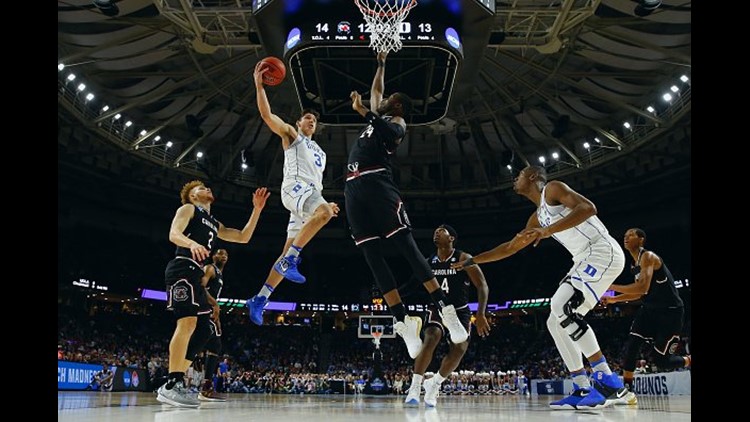Carolina, playing with what could be considered a home-court — or at least a home-state — edge, beat Duke Sunday night to move into the NCAA “Sweet Sixteen.”
A win’s a win, but it gets a little complicated after that.
It wasn’t Duke arch-rival North Carolina that knocked the No. 2 seed Blue Devils out of the East Regional. It was South Carolina, the 7 seed in the region, that advanced into more March Madness with a win over Duke, 88-81.
And the game wasn’t played as originally scheduled in North Carolina, home to UNC, Duke and a few hundred thousand rabid basketball fans. It was played in South Carolina, thanks to North Carolina’s infamous “bathroom bill.”
That bill — legally known as HB2 — bans people from using public bathrooms that don’t correspond to their biological sex as listed on their birth certificates. It also reserves to the state government the right to pass nondiscrimination legislation, saying state laws preempt any local ordinances.
Among the fallout for the Tar Heel state since HB2 took effect in March 2016 has been the loss of high-interest — and high-revenue — events, including the NCAA tournament games that were played over the weekend.
In September, the NCAA announced it was moving previously awarded championship events out of North Carolina during the 2016-17 academic year.
The affected events include this year’s Division I Men’s Basketball Championship first and second rounds that had been scheduled to be held in Greensboro, North Carolina on Friday and Sunday. Instead, those were relocated to Greenville, South Carolina, about 190 miles away; the NCAA announced that move in October.
In addition to the NCAA moving championship events out of the state, the 2017 NBA All-Star Game, which was held in February, was moved out of Charlotte to New Orleans.
South Carolina, which enjoyed hosting a full weekend of tournament basketball thanks to that law in the state to the north, has not been without its issues and controversies.
In 2001, the NCAA boycotted hosting any championships in the state because the Confederate flag was flying on Statehouse grounds in Columbia. The flag was removed in July 2015, the month after nine people were were shot and killed inside the historic Emanuel African Methodist Episcopal Church in Charleston. Gunman Dylann Roof later became the first person convicted of a federal hate crime to get receive the death penalty.
“This step sends an important message of respect for and dignity of every person,” NCAA President Mark Emmert said when the flag was removed.
In North Carolina, legislation has been filed that would repeal HB2 and expand LGBT protections, and Gov. Roy Cooper, elected in November, has called on the legislature to repeal the law.
Meanwhile, the namesake teams from both Carolinas — North and South — move on to the NCAA’s Sweet Sixteen, with North Carolina advancing Sunday with a 72-65 win over Arkansas.



